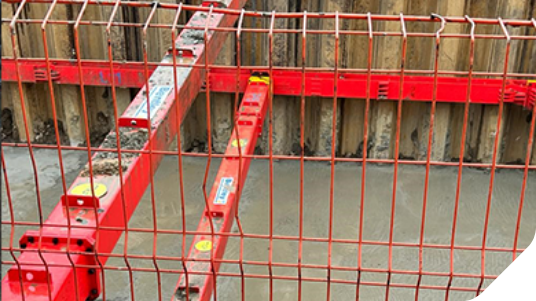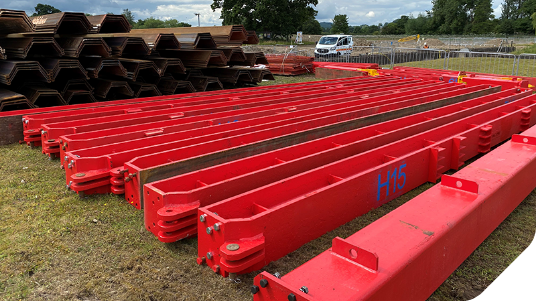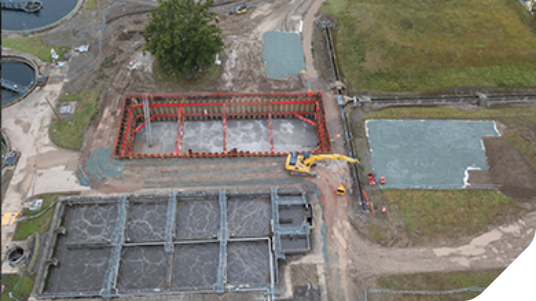
The purpose of this project was to upgrade the existing sewage treatment works at Mile Oak in Shropshire. This included the construction of a new activated sludge plant (ASP), final settlement tank (FST), tertiary solids removal plant, ferric dosing plant and all associated pipework.
MGF engaged early in the design phase through an existing relationship with the team at Mott Macdonald Bentley (MMB). Once the conceptual designs for the ASP and FST were complete, a Microsoft Teams meeting was arranged to discuss the proposals and notably the interaction between temporary and permanent works in further detail.

Mile Oak Sewage Treatment Works
JN Bentley for Severn Trent Water
Rob Eagles, Regional Engineering Manager
A cost effective and carbon saving temporary works solution
Following the award of the temporary works, MGF’s R&D prepared a short animation, which detailed a 3D output installation sequence. The intention of this was a digital rehearsal to share information with the delivery team for possible improvements; it was also available to use during toolbox talks to understand key stages.
For the ASP, the optimised TWD included a multi-frame sheet piled solution – 40.5m long x 15.2m wide x 6.5m deep. This included the use of GU16N piles in combination with the MGF 406UC, 400 series cross struts and knee braces. The temporary works equipment allowed the permanent ASP structure to be built internally and backfilled around the outside.
Working in collaboration with the Principal Geotechnical Engineer from MMB, four analyses were carried out and independently checked. This included total and effective stress analysis at the North and South of the cofferdam.
During an initial meeting, groundwater levels were agreed upon, based on current plus historic data and the time of year the excavation was planned to take place.
An allowance was also made to over-excavate the South end of the cofferdam to remove a band of silt that was expected, based on the ground models.
MGF marked each piece of the frame with a correlating drawing number to assist with installation.



The collaboration guaranteed the use of a two-frame solution instead of three, reducing costs by approximately £4000 per week. Wider savings of this solution included the time to install the third frame and the potential impact on the programme.
Environmentally, the removal of the third frame prevented approximately 476kg CO₂e being released into the atmosphere. This calculation is based on 3 articulated lorry deliveries (6 journeys at 9 MPG). MGF were invited to three JN Bentley seminars across the country to celebrate fifty years of project delivery. Here, we demonstrated best practice, highlighted the Mile Oak project and were happy to affirm our continued relationship with MMB.

Our 400 series strut is a highly versatile, heavy duty modular bracing strut system designed primarily for use with hydraulic …

Our 406UC Brace has been designed to brace large and deep cofferdams, these are frequently used on major basement and …
Whether you have a question, need a quote, or want to discuss a project, our dedicated team is ready to assist you.